三级语法常见考点
英语三级语法考点归纳

部分倒装 ①否定副词never, seldom, rarely, little, hardly, scarcely等位于句首 如:Never have I read such an interesting book. ②“only+状语”位于句首 如:Only in this way did I finish the homework. ③so/such…that引导的结果状语从句时,so/such置于句首 如:So frightened was he that he didn’t even want to move a pace. ④as/ though引导让步状语从句 如:Child as he is, he knows a lot. ⑤if引导的虚拟条件句中,若将if省略,were, had, should要提前 如:Should it rain tomorrow, we would stay at home. ⑥so / neither / nor表示“前面所说的情况也适合于后者时” 如:I came back late and so did my mother. ⑦当not until…位于句首时,其后的主句要用倒装语序 如:Not until the rain stopped did he leave the room.
Now that the room didn’t live up to the promises you makd in the advertisement, I want to ask for compensation. (2011.06 T20)
should/could/would/might do
公共英语三级语法知识汇总

公共英语三级语法知识大全一、句法分析 (1)二、词法分析 (2)三、时态 (8)四、被动语态 (11)五、情态动词 (12)六、不定式 (14)七、定语从句 (17)八、主语从句 (22)九、表语从句 (23)十、宾语从句 (23)十一、同位语从句 (24)十二、状语从句 (25)十三、虚拟语气 (41)十四、动名词 (27)十五、现在分词 (28)十六、过去分词 (31)十七、独立主格结构 (34)十八、倒装句型 (35)十九、强调句型 (36)二十、主谓一致 (37)二十一、It的用法 (39)一、句法分析1、主语:是句子要说明的人或物,可以作主语的成分有名词,主语一般在句首。
注意名词单数形式常和冠词不分家!. 1) Mr. Lee is a well-known scientist.名词作主语. 2) He reads newspapers everyday.代词作主语. 3) Two and ten is twelve.数词作主语. 4) Smoking is harmful to the health.动名词作主语. 5) To swim in that pool is a great pleasure.动词不定式作主语. 6) What we shall do next is not yet decided.从句作主语2、谓语: 说明主语的动作,状态或特征. 1) The new term begins on the 1st of September.. 2) His father is an engineer.3) She seemed happy.. 4) Li Hua showed me his album.3、宾语:指的是及物动词涉及到的人或物. 1) Wang Ling lent me a novel to read in the bus.. 2) The medicine is good for a cold.. 3) How many pieces do you want?. 4) My little sister always likes to ask questions.. 5) Would you mind coming earlier tomorrow?. 6) He asked me what I was going to do tonight4、宾语补足语:在宾语后面补充说明宾语的动作、状态、特征。
公共英语三级语法知识汇总

公共英语三级语法知识大全一、句法分析 (1)二、词法分析 (2)三、时态 (8)四、被动语态 (11)五、情态动词 (12)六、不定式 (14)七、定语从句 (17)八、主语从句 (22)九、表语从句 (23)十、宾语从句 (23)十一、同位语从句 (24)十二、状语从句 (25)十三、虚拟语气 (41)十四、动名词 (27)十五、现在分词 (28)十六、过去分词 (31)十七、独立主格结构 (34)十八、倒装句型 (35)十九、强调句型 (36)二十、主谓一致 (37)二十一、It的用法 (39)一、句法分析1、主语:是句子要说明的人或物,可以作主语的成分有名词,主语一般在句首。
注意名词单数形式常和冠词不分家!. 1) Mr. Lee is a well-known scientist.名词作主语. 2) He reads newspapers everyday.代词作主语. 3) Two and ten is twelve.数词作主语. 4) Smoking is harmful to the health.动名词作主语. 5) To swim in that pool is a great pleasure.动词不定式作主语. 6) What we shall do next is not yet decided.从句作主语2、谓语: 说明主语的动作,状态或特征. 1) The new term begins on the 1st of September.. 2) His father is an engineer.3) She seemed happy.. 4) Li Hua showed me his album.3、宾语:指的是及物动词涉及到的人或物. 1) Wang Ling lent me a novel to read in the bus.. 2) The medicine is good for a cold.. 3) How many pieces do you want?. 4) My little sister always likes to ask questions.. 5) Would you mind coming earlier tomorrow?. 6) He asked me what I was going to do tonight4、宾语补足语:在宾语后面补充说明宾语的动作、状态、特征。
公共英语三级主要语法点

Dear同学们,以下是公共英语三级的主要九个语法点。
希望同学们有时间看看。
第一,虚拟语气。
第二,定语从句。
第三,反意疑问句。
第四,倒装句。
第五,主谓一致。
第六,强调句。
第七,连词的辨析。
第八,省略句。
第九,现在分词作状语。
第一,虚拟语气。
它主要可分为以下情况:A,表建议,要求,命令的动词,及与其相关的名词、形容词或分词,后面的从句中都要用should+动词原形作谓语,should可省略。
B,某些特殊的形容词,后面常跟虚拟语气。
这一点要尤其注意。
C,wish后表示与现实相反的愿望时要用虚拟语气。
D,would rather后若加从句则要用过去式表示虚拟语气,也可以直接加do sth宁愿做…。
E,If引导的条件状语中,表示与现在情况相反的假设,表示与过去情况相反的假设时。
虚拟语气这个考点在近两年当中出现的考分这两年稍微偏高,这一点尤其大家要格外的关注一些。
第二,定语从句。
这次考试对定语从句的考察是重点考察关系词选择和非限定性定语从句。
关系词的选择关键要从其在从句中担任着的成分决定的,而不是在主句中的。
非限定性定语从句通常由逗号与修饰的名词相隔开,而且只能由which,who,whom,whose引导,其中which既可以指物,也可以指前面一整句话,这一点大家一定要注意。
另外介词和上面的关键词连用构成符合关系词的情况也很多。
第三,反意疑问句。
可以有两点,句子本身含有否定意义的时候,比如seldom后面用肯定形式的反问。
第二,考察祈使句的反问,对陈述部分是肯定句的祈使句。
第三,I think,I believe,I suppose等表示主观看法的句子,其反意疑问句由后面的宾语从句相对应。
第四,倒装句。
倒装句一共有三项应该注意:A,only后面加状语,并放于句首时,句子用倒装;而当其修饰其它成分时不倒装。
B,表示否定意义的副词或短语,如seldom,never,rarely,in no time。
C,注意Hardly/scarcely/barely had sb done…when这一句型,表示一——就…(as soon as后不加倒装)第五,主谓一致。
大学英语三级语法知识总结汇总

三级语法考点归纳一.虚拟语气1. if 句中虚拟形式if 引导的非真实条件句(纯粹假设或发生的可能性不大):条件从句主句与现在相反did (be were) would/ should/ might/ could do与将来相反did (be were) would/ should/ might/ could do与过去相反had done would/ should/ might/ could have done例句If we left (leave) now, we should arrive in time.If they hadn’t gone on vacation, their house wouldn’t have been broken (break) into.2. 原形虚拟:a. 表命令、决定、要求、建议等词语之后的that-分句中,用动词原形。
suggest, demand, advise, propose, order, arrange, insist, command, require, request, desire …… that +(should) do例如He suggested that we should leave early.My suggestion is that we should tell him.b. It is (was) 形容词/名词that …… (should) do/例如It is absolutely essential that all the facts be examined first.3. 一些句型中的虚拟形式:1. It’s (high, about, the first, etc.) time (that) …动词过去时…例如It’s time we left.例如It is time we went to bed.2 would rather/sooner 宁愿as if/ though 好像would rather/sooner 谓语用过去时与现在或者将来相反as if/ though 谓语用过去完成时与过去相反4.练习1. I _______ try it again if I_______you.A. will;amB. should;amC. would;wereD. would;had been2. If it _______ not for the water,the plants _______live.A. were;would notB. is;could notC. were;couldD. did;could not3. If I _______ that chance to show my ability, I _______the president of this school.A. have not had;could not becomeB. had not had;would not have becomeC. did not have;could not becomeD. doesn’t have;will not become4. He _______ by that burglar if you _______ to save him.A. might have been killed;hadn’t comeB. will be killed;didn’t comeC. may be killed;did’t comeD. could be killed;haven’t come5. If it _______for your help,I _______that hard time with so little money.A. were not;would not spendB. is not;can not spendC. had not been;would not have spentD. have not been;will not spend6. Where _______ you go if war _______?A. will;breaks outB. do;will break outC. would;were to break outD. will;is to break out7. She wishes she _______ that humiliating thing.A. doesn’t doB. didn’t doC. haven’t doneD. hadn’t done8. The chairman suggested that the meeting _______ put off.A. can beB. beC. isD. will be9. It is vital that he _______ immediately.A. should goB. must goC. goesD. went10. It is time we _______do our homework.A. begin toB. can begin toC. began toD. will begin to答案:1.选C。
公共英语三级语法大总结
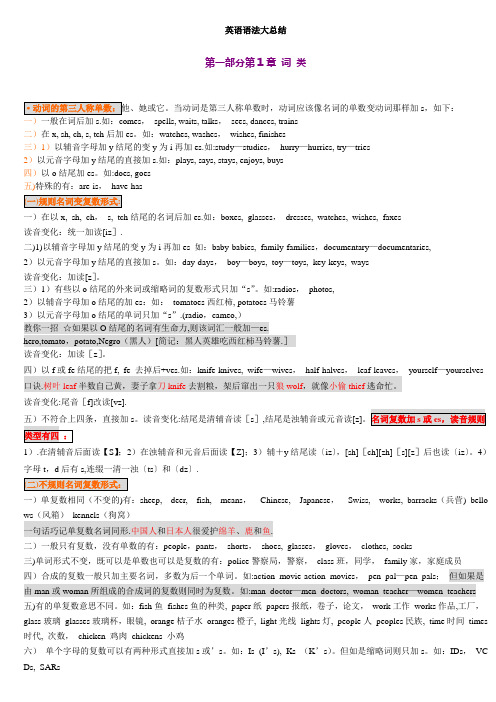
英语语法大总结第一部分第1章词类s,如下:一)一般在词后加s.如:comes,spells, waits, talks,sees, dances, trains二)在x, sh, ch, s, tch后加es。
如:watches, washes,wishes, finishes三)1)以辅音字母加y结尾的变y为i再加es.如:study—studies,hurry—hurries, try—tries2)以元音字母加y结尾的直接加s.如:plays, says, stays, enjoys, buys四)以o结尾加es。
如:does, goes五)特殊的有:are-is,have-has一)在以x, sh, ch,s, tch结尾的名词后加es.如:boxes, glasses,dresses, watches, wishes, faxes读音变化:统一加读[iz].二)1)以辅音字母加y结尾的变y为i再加es 如:baby-babies, family-families,documentary—documentaries,2)以元音字母加y结尾的直接加s。
如:day-days,boy—boys, toy—toys, key-keys, ways读音变化:加读[z]。
三)1)有些以o结尾的外来词或缩略词的复数形式只加“s”。
如:radios,photos,2)以辅音字母加o结尾的加es:如:tomatoes西红柿, potatoes马铃薯3)以元音字母加o结尾的单词只加“s”.(radio,cameo,)教你一招☆如果以O结尾的名词有生命力,则该词汇一般加—es.hero,tomato,potato,Negro(黑人)[简记:黑人英雄吃西红柿马铃薯.]读音变化:加读[z]。
四)以f或fe结尾的把f, fe 去掉后+ves.如:knife-knives, wife—wives,half-halves,leaf-leaves,yourself—yourselves 口诀.树叶leaf半数自己黄,妻子拿刀knife去割粮,架后窜出一只狼wolf,就像小偷thief逃命忙。
三级英语语法重点

三级英语语法重点第一节动词的时态:讲12种特别关注:1、一般现在时的特殊用法;2、一般过去时;3、过去进行时4、现在完成时5、过去完成时;6、将来完成时;7、现在完成进行完成时;8、过去完成进行时。
一、一般现在式:特殊用法:在时间状语、条件状语从句(if, unless)中表示将来的动作:A.时间状语(before, after, untill, as soon as, when):They will go home for winter vocation as soon as they _finish_their exams.When the mixture _is heated , it will give off a powerful force.34.”When are you going to visit your uncle in Chicago?”“As soon as D.we complete our work for tomorrow.” (03/11试A)B.条件状语(if, unless):We’ll go fishing if w eather is good tomorrow.D。
改为is free。
when引导的时间状语从句中要用一般现在时表示将来。
2000年试题AI can’t go to your birthday party unless my father agrees.除非我爸爸同意,否则我去不了你的生日会二、一般过去时:(要掌握常用不规则动词的过去式及过去分词形式,40个左右)1、简单陈述去过的动作或状态:would do2、used to do sth 过去常常做(现在不做了);be used to doing 习惯于做……(现在还在做)We used to swim in the river when we were in the countryside.我们过去常在河里游泳。
三级公共英语语法重点

• would rather+从句,是一个常用的虚拟语 气句型 Would rather+从句,谓语一般用过去 时来表示现在或将来。其意为“宁愿……, 还是…… 好些”“一个人宁愿另一个人做 某事”。引导从句的that常省略。在谈到过 去的动作时,谓语则用过去完成时。
• John wants to see me today. I would rather he came to tomorrow than today. 约 翰今天想去看我。我宁愿他明天来看我而 不是今天。(句中came不是表示过去而是表 示将来)
• No sooner …than 刚一…就 • We had no sooner sat down than we found it was time to go. • No sooner had we sat down than we found it was time to go.
• Now that : since • Now that you are grown up, you must stop this childish behavior. • So… as 像…一样 否定句 • This room is not so large as that one. • So far as 就… • So far as I know, he will be away for three we名词+but also +名词 名词+but +名词
• Not only… + 名词+but also +名词作主语的 结构中,谓语动词与but also 后的名词的数 保持一致。 • Not only his wife but also his children have arrived.
三级英语语法重点

三级英语语法重点第一节动词得时态:讲12种ﻫ特别关注:1、一般现在时得特殊用法;2、一般过去时;3、过去进行时4、现在完成时5、过去完成时;6、将来完成时;7、现在完成进行完成时;8、过去完成进行时。
一、一般现在式:ﻫ特殊用法:在时间状语、条件状语从句(if, unless)中表示将来得动作:A.时间状语(before, after, untill,as soon as,when):They willgohome for winter vocationas soonas they _finish_their exams、Whenthemixture_is heated ,itwill give offapowerful force、34、”When areyougoing to visityour unclein Chicago?”ﻫ“As soon as D、we plete ourwork for tomorroﻫ D。
改为is fre w、” (03/11试A)ﻫﻫB.条件状语(if,unless):ﻫWe’ll gofishing if weather is good tomorrow、ﻫe。
when引导得时间状语从句中要用一般现在时表示将来。
2000年试题AﻫI can’t go to yourbirthday party unless my father ag rees、ﻫ除非我爸爸同意,否则我去不了您得生日会ﻫ二、一般过去时:(要掌握常用不规则动词得过去式及过去分词形式,40个左右)ﻫ1、简单陈述去过得动作或状态:woulddo ﻫ2、usedtodo sth 过去常常做(现在不做了);beusedto doing习惯于做……(现在还在做)ﻫWe used to swim inthe river when we were in the countryside、3、It is …t ﻫ我们过去常在河里游泳。
2023年三级英语语法重点
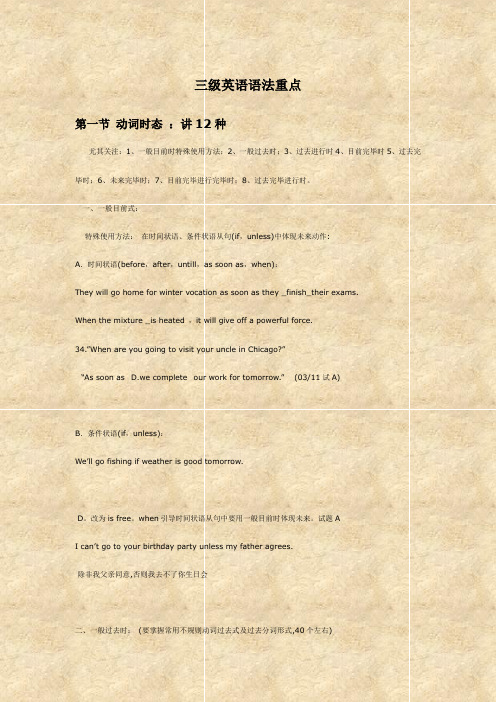
三级英语语法重点第一节动词时态:讲12种尤其关注:1、一般目前时特殊使用方法;2、一般过去时;3、过去进行时4、目前完毕时5、过去完毕时;6、未来完毕时;7、目前完毕进行完毕时;8、过去完毕进行时。
一、一般目前式:特殊使用方法:在时间状语、条件状语从句(if,unless)中体现未来动作:A.时间状语(before,after,untill,as soon as,when):They will go home for winter vocation as soon as they _finish_their exams.When the mixture _is heated ,it will give off a powerful force.34.”When are you going to visit your uncle in Chicago?”“As soon as D.we complete our work for tomorrow.” (03/11试A)B.条件状语(if,unless):We’ll go fishing if weather is good tomorrow.D。
改为is free。
when引导时间状语从句中要用一般目前时体现未来。
试题AI can’t go to your birthday party unless my father agrees.除非我父亲同意,否则我去不了你生日会二、一般过去时:(要掌握常用不规则动词过去式及过去分词形式,40个左右)1、简朴陈说去过动作或状态:would do2、used to do sth 过去常常做(目前不做了);be used to doing 习惯于做……(目前还在做)We used to swim in the river when we were in the countryside.咱们过去常在河里游泳。
(目前不了)The old man is used to getting up early in the morning. 老人习惯早起3、It is …time since +从句引导时间状语从句中,since后谓语动词用一般过去时(自从…以来)54. No one can possibly recall any detail about the meeting. It is at least five years since it C. took place . A卷三、一般未来时1、will(shall)+原形动词:体现未来动作或状态。
大学英语三级语法知识总结汇总
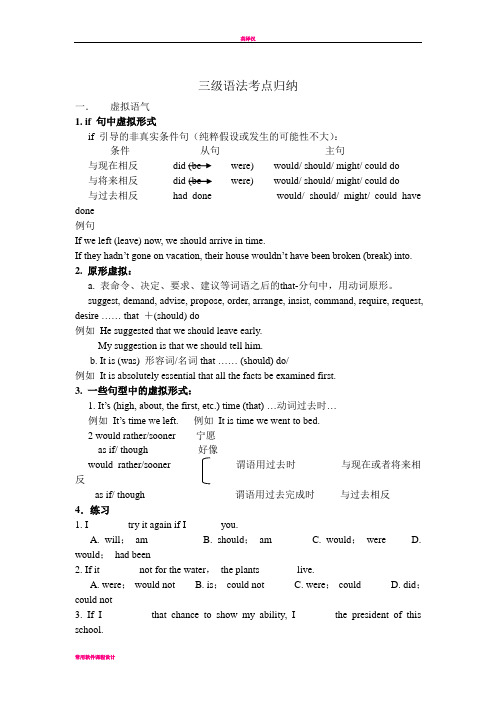
三级语法考点归纳一.虚拟语气1. if 句中虚拟形式if 引导的非真实条件句(纯粹假设或发生的可能性不大):条件从句主句与现在相反did (be were) would/ should/ might/ could do与将来相反did (be were) would/ should/ might/ could do与过去相反had done would/ should/ might/ could have done例句If we left (leave) now, we should arrive in time.If they hadn’t gone on vacation, their house wouldn’t have been broken (break) into.2. 原形虚拟:a. 表命令、决定、要求、建议等词语之后的that-分句中,用动词原形。
suggest, demand, advise, propose, order, arrange, insist, command, require, request, desire …… that +(should) do例如He suggested that we should leave early.My suggestion is that we should tell him.b. It is (was) 形容词/名词that …… (should) d o/例如It is absolutely essential that all the facts be examined first.3. 一些句型中的虚拟形式:1. It’s (high, about, the first, etc.) time (that) …动词过去时…例如It’s time we left.例如It is time we went to bed.2 would rather/sooner 宁愿as if/ though 好像would rather/sooner 谓语用过去时与现在或者将来相反as if/ though 谓语用过去完成时与过去相反4.练习1. I _______ try it again if I_______you.A. will;amB. should;amC. would;wereD. would;had been2. If it _______ not for the water,the plants _______live.A. were;would notB. is;could notC. were;couldD. did;could not3. If I _______ that chance to show my ability, I _______the president of this school.A. have not had;could not becomeB. had not had;would not have becomeC. did not have;could not becomeD. doesn’t have;will not become4. He _______ by that burglar if you _______ to save him.A. might have been killed;hadn’t comeB. will be killed;didn’t comeC. may be killed;did’t comeD. could be killed;haven’t come5. If it _______for your help,I _______that hard time with so little money.A. were not;would not spendB. is not;can not spendC. had not been;would not have spentD. have not been;will not spend6. Where _______ you go if war _______?A. will;breaks outB. do;will break outC. would;were to break outD. will;is to break out7. She wishes she _______ that humiliating thing.A. doesn’t doB. didn’t doC. haven’t doneD. hadn’t done8. The chairman suggested that the meeting _______ put off.A. can beB. beC. isD. will be9. It is vital that he _______ immediately.A. should goB. must goC. goesD. went10. It is time we _______do our homework.A. begin toB. can begin toC. began toD. will begin to答案:1.选C。
公共英语三级语法大总结
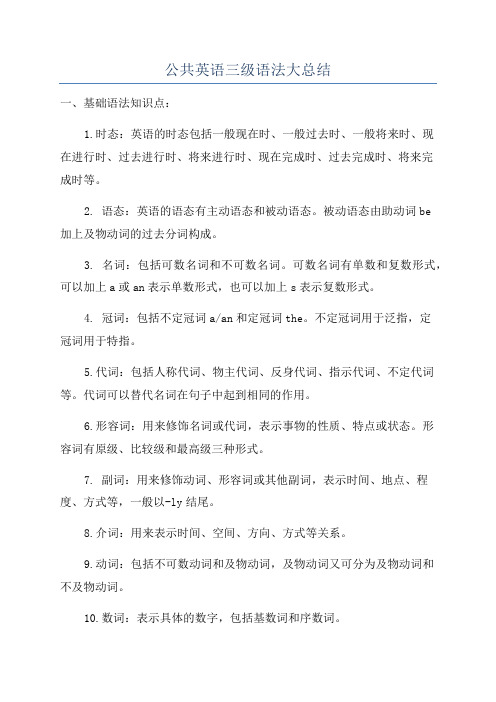
公共英语三级语法大总结一、基础语法知识点:1.时态:英语的时态包括一般现在时、一般过去时、一般将来时、现在进行时、过去进行时、将来进行时、现在完成时、过去完成时、将来完成时等。
2. 语态:英语的语态有主动语态和被动语态。
被动语态由助动词be加上及物动词的过去分词构成。
3. 名词:包括可数名词和不可数名词。
可数名词有单数和复数形式,可以加上a或an表示单数形式,也可以加上s表示复数形式。
4. 冠词:包括不定冠词a/an和定冠词the。
不定冠词用于泛指,定冠词用于特指。
5.代词:包括人称代词、物主代词、反身代词、指示代词、不定代词等。
代词可以替代名词在句子中起到相同的作用。
6.形容词:用来修饰名词或代词,表示事物的性质、特点或状态。
形容词有原级、比较级和最高级三种形式。
7. 副词:用来修饰动词、形容词或其他副词,表示时间、地点、程度、方式等,一般以-ly结尾。
8.介词:用来表示时间、空间、方向、方式等关系。
9.动词:包括不可数动词和及物动词,及物动词又可分为及物动词和不及物动词。
10.数词:表示具体的数字,包括基数词和序数词。
11.简单句:由主语和谓语构成,可以包含宾语、表语、宾语补足语等。
12.并列句:由两个或多个简单句用并列连词连接而成,表示并列关系。
13.复合句:包括主从复合句和连接复合句。
主从复合句由一个主句和一个或多个从句构成,连接复合句由两个或多个从句构成。
14.修饰语从句:修饰一个名词或代词的从句,通常由关系代词或关系副词引导。
15.定语从句:修饰一个名词或代词的从句,通常由关系代词或关系副词引导。
16.状语从句:修饰动词、形容词或副词的从句,通常由连词或连词短语引导。
17.祈使句:表示请求、命令、建议等,一般不指明主语,用动词原形开头。
18.感叹句:表示惊讶、高兴、忧虑等感叹的句子。
19.反意疑问句:用来表示征求对方的同意或确认,一般由一个陈述句和相应的疑问句组成。
二、高级语法结构:1.过去完成时:表示在过去一些时间点之前已经完成的动作或事件。
大学英语三级考试语法复习要点【精选】
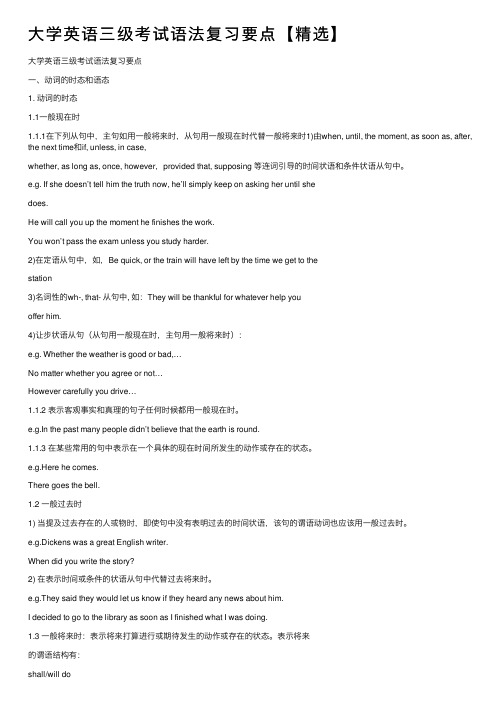
⼤学英语三级考试语法复习要点【精选】⼤学英语三级考试语法复习要点⼀、动词的时态和语态1. 动词的时态1.1⼀般现在时1.1.1在下列从句中,主句如⽤⼀般将来时,从句⽤⼀般现在时代替⼀般将来时1)由when, until, the moment, as soon as, after, the next time和if, unless, in case,whether, as long as, once, however,provided that, supposing 等连词引导的时间状语和条件状语从句中。
e.g. If she doesn’t tell him the truth now, he’ll simply keep on asking her until shedoes.He will call you up the moment he finishes the work.You won’t pass the exam unless you study harder.2)在定语从句中,如,Be quick, or the train will have left by the time we get to thestation3)名词性的wh-, that- 从句中, 如:They will be thankful for whatever help youoffer him.4)让步状语从句(从句⽤⼀般现在时,主句⽤⼀般将来时):e.g. Whether the weather is good or bad,…No matter whether you agree or not…However carefully you drive…1.1.2 表⽰客观事实和真理的句⼦任何时候都⽤⼀般现在时。
e.g.In the past many people didn’t believe that the earth is round.1.1.3 在某些常⽤的句中表⽰在⼀个具体的现在时间所发⽣的动作或存在的状态。
英语三级语法考点

C
(2011.12-19题) Since the new technology was introduced last month, we ______ in speeding up production. A. succeed B. succeeded C. have succeeded D. will succeed
八大基本时态 had+动词过去分词 have/has +动词过去分词
过去完成时用法之表未曾实现的想法
过去完成时可表示过去未曾实现的想法和打算,通常连用的动词是 want, think, hope, plan, mean, expect, intend, suppose 等: I had meant to come, but something happened. 我本想来,但有事就没有来。 I had intended to speak, but time did not permit. 我本想发言,但时间不允许。 We had hoped that you would come to see us, but you didn’t. 我们本想你来看我们的,但你没有来。
真题回放
(11年12月A 17题) Now the air pollution in this city ______ more and more serious with each passing day. A. to become B. became C. becoming D. is becoming (2010.5-17题) According to the time table, the train for Beijing ____ at 9:10 P.m.from Monday to Friday. A) was leaving B) is leaving C) leaves D) has left 注:一般现在时可以表预定的行为
大学英语三级考试语法总结
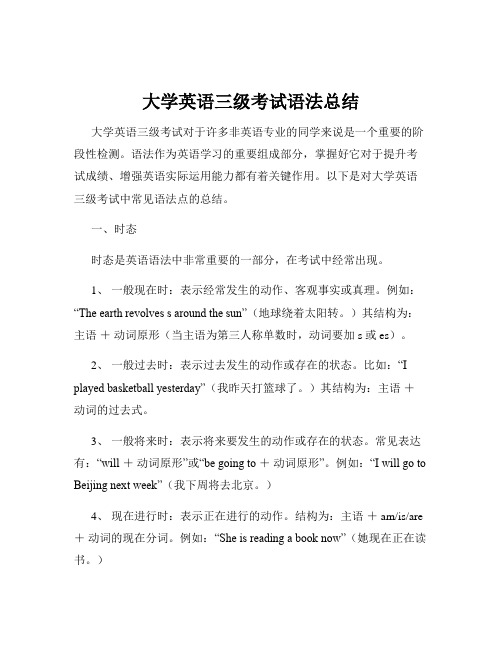
大学英语三级考试语法总结大学英语三级考试对于许多非英语专业的同学来说是一个重要的阶段性检测。
语法作为英语学习的重要组成部分,掌握好它对于提升考试成绩、增强英语实际运用能力都有着关键作用。
以下是对大学英语三级考试中常见语法点的总结。
一、时态时态是英语语法中非常重要的一部分,在考试中经常出现。
1、一般现在时:表示经常发生的动作、客观事实或真理。
例如:“The earth revolves s around the sun”(地球绕着太阳转。
)其结构为:主语+动词原形(当主语为第三人称单数时,动词要加 s 或 es)。
2、一般过去时:表示过去发生的动作或存在的状态。
比如:“I played basketball yesterday”(我昨天打篮球了。
)其结构为:主语+动词的过去式。
3、一般将来时:表示将来要发生的动作或存在的状态。
常见表达有:“will +动词原形”或“be going to +动词原形”。
例如:“I will go to Beijing next week”(我下周将去北京。
)4、现在进行时:表示正在进行的动作。
结构为:主语+ am/is/are +动词的现在分词。
例如:“She is reading a book now”(她现在正在读书。
)5、过去进行时:表示过去某个时刻正在进行的动作。
其结构为:主语+ was/were +动词的现在分词。
如:“I was watching TV at eighto'clock last night”(昨晚八点我正在看电视。
)6、现在完成时:表示过去发生的动作对现在造成的影响或结果,或者过去开始一直持续到现在的动作。
结构为:主语+ have/has +过去分词。
比如:“I have finished my homework”(我已经完成了作业。
)7、过去完成时:表示过去某个时间之前已经完成的动作。
结构为:主语+ had +过去分词。
例如:“By the end of last year, we had learned 2000 words”(到去年年底,我们已经学了 2000 个单词。
公共英语三级语法大总结

英语语法大总结第一部分第1章词类s,如下:一)一般在词后加s。
如:comes, spells, waits, talks, sees, dances, trains二)在x, sh, ch, s, tch后加es。
如:watches, washes, wishes, finishes三)1)以辅音字母加y结尾的变y为i再加es。
如:study-studies, hurry-hurries, try-tries2)以元音字母加y结尾的直接加s。
如:plays, says, stays, enjoys, buys四)以o结尾加es。
如:does, goes五)特殊的有:are-is, have-has一)在以x, sh, ch, s, tch结尾的名词后加es。
如:boxes, glasses, dresses, watches, wishes, faxes 读音变化:统一加读[iz]。
二)1)以辅音字母加y结尾的变y为i再加es 如:baby-babies, family-families,documentary-documentaries, 2)以元音字母加y结尾的直接加s。
如:day-days, boy-boys, toy-toys, key-keys, ways读音变化:加读[z]。
三)1)有些以o结尾的外来词或缩略词的复数形式只加“s”。
如:radios, photos,2)以辅音字母加o结尾的加es:如: tomatoes西红柿, potatoes马铃薯3)以元音字母加o结尾的单词只加“s”。
(radio,cameo,)教你一招☆如果以O结尾的名词有生命力,则该词汇一般加-es。
hero,tomato,potato,Negro(黑人)[简记:黑人英雄吃西红柿马铃薯。
]读音变化:加读[z]。
四)以f或fe结尾的把f, fe 去掉后+ves。
如:knife-knives, wife-wives, half-halves, leaf-leaves, yourself-yourselves 口诀。
- 1、下载文档前请自行甄别文档内容的完整性,平台不提供额外的编辑、内容补充、找答案等附加服务。
- 2、"仅部分预览"的文档,不可在线预览部分如存在完整性等问题,可反馈申请退款(可完整预览的文档不适用该条件!)。
- 3、如文档侵犯您的权益,请联系客服反馈,我们会尽快为您处理(人工客服工作时间:9:00-18:30)。
三级语法常见考点:
1.虚拟
一.If 现在,过去,将来
08.4.81
如果我是他,我就会尽最大的努力按时完成任务。
虚拟–现在—从句过去时,主句
should do—do/try one’s best to do
–finish/complete/accomplish task –on time 按时in time 准时
If I were he, I would try my best to finish the task/work on time.
二.含蓄介词,分词without,with
三.特殊结构
1)现在,将来—过去时
过去--过去完成时
wish/ if only / as if ,as though 2)过去时
It is (high) time that 过去时would rather=’d rather 过去时3)(should)do
1))建议命令要求
2))It is a. that +do
3))in case, lest, for fear that In the case of
Because 句子
Because of 词
2.比较
1)A is
A is 几倍
2)A is as 原级as B.
A is 几倍
as 原级+ 其他成分+ as 3)the more…, the more
05.4.46/48
05.11.28
06.4.17
06.11.41(几分之几)
07.11.44
08.4.26
08.11.20
3.反意疑问句
前肯后否,前否后肯
实义动词,助动词
I don’t think he will come,he?助动词
特殊
04.11.22
05.4.34
05.11.41
06.4.28
07.4.49
Dear Helen, please forgive him for his rudeness, can you?
29.
4.主谓一致
04.11.28
05.4.42/47 05.11.52
5.强调句
04.11.51
05.4.27/51
05.11.40
06.4.36
07.4.70
08.11.31/32
6.倒装句
04.11.33
05.11.36.42.55 42.adj.+as sb. is
07.4.16
08.4.44 08.4.51 7.时态
04.11.30.41
05.4.50
07.11.43
08.4.33
情态动词
04.11.35
05.11.20.21.30.33 07.11.46.30
被动be done
04.11.48
05.4.33
05.11.35
06.4.22.23.48。
